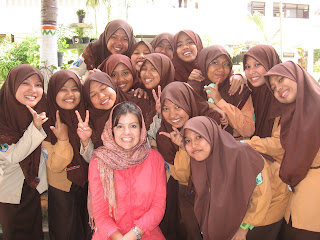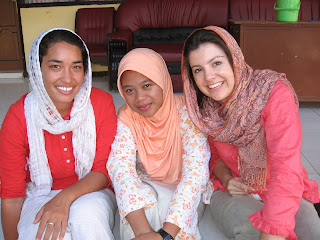Indonesians have an expression that they use when they have not done something. Rather than saying tidak, or “no,” they say belum, which means “not yet.” I recall an early conversation I had with someone before I knew such a phrase existed. She had asked if I had kids and I said “no.” Then I asked if she had kids and she said, “no, I am not married…not yet.” I remember thinking, wow I wonder if that’s a statement of faith, she is not married now, but believes that she will be someday. Not yet. Interesting. And, I let it pass.
Later I realized she was translating a common Indonesian expression, one I use daily now. “Have you visited Bali?” Belum. “Have you tried Durian?” Belum. “Do you have kids?” Belum. While it’s a fine expression as a response to certain questions, for others it sounds presumptuous. For starters, “not yet” indicates desire. Secondly, it indicates probability. So what if I don’t want to go to Bali (just for the sake of argument)? Or what if I can’t have kids? Do I really need to use belum if something may or may not happen? This goes for marriage too. Why can’t a simple “no” suffice? [Because if you answer with “no” you will be corrected…it’s belum]
I started thinking about how Indonesians would reply to a situation that was seen as negative or undesirable. Have you been in a motorbike accident before? Have you ever lost your hand phone? It was as I was considering whether belum would be used in these sorts of situations that I realized Americans have something to say for the negative scenarios: “No…knock on wood!” So unless we take appropriate action by banging on a wooden surface (or something resembling wood), we suspect the bad may come our way. This kind of presumption sounds a bit more like cynicism. And, I don’t really get the wood thing.
I continue to use belum in all the correct scenarios. And I am aware that my feelings about it have more to do with the differences in cultural expectations for marriage and child bearing than the word itself. Interestingly, I suspect Indonesians may be seeking to protest too. There’s a catchy song on the Indonesian airwaves. All the lyrics are in Bahasa Indonesian, except for one line.
She sings “I am single and very happy.”
Take that, belum.
Saturday, May 23, 2009
Thursday, May 14, 2009
Visiting Villages

The bonuses of living in a city are many. I realize, however, that there’s a tradeoff. While I can access conveniences, enjoy some anonymity along with the other westerners, and dodge boredom, I miss out on hearing the wind while walking through a rice field, say, or the offers to drink tea in someone’s home as I walk by. The most significant difference is that as a foreigner in a village one becomes a spectacle, rather than just another boule in the city.
The Women’s Coalition of Indonesia (KPI) held an event in a village near Yogya to celebrate Kartini Day. Kartini is celebrated as a pioneer of women’s rights in Indonesia. A friend picked me up on a Saturday night. We arrived in the village and were greeted by women wearing traditional kebaya, the nicest clothing a woman can wear in Indonesia. The women planned an evening of traditional dances (interspersed with a few pre-teen dances to Brittney Spears songs) and speeches. They served red spiced ginger tea and boxes of cakes under a canopied area that accommodated a few hundred people from three different villages. Each village leader gave a speech about the work of KPI in their respective villages.
At one point, one of the village leaders mentioned America in his speech, and I realized he was looking at and referring to me, the foreigner in attendance. My friend started to laugh because he was apparently trying to guess whether I was from America or Japan. That was topped by the request that I sing a song. I persuaded them that I did not sing well. Instead, I was given the honor of presenting the gift to the winner of the dance competition. And, I was interviewed for a video they were creating on KPI.
A few days later, I made a trip to east Java, where Erin, an alum of Pepperdine, is teaching English in an all girls' Islamic boarding school. In the village of Coper, Erin has to represent the U.S. in a way that many of us don’t. Her predecessor was an American who did not like rice (yes it’s hard to imagine what she ate here). When Erin arrived everyone was so interested to learn that she actually liked and ate rice because “Ms. Natalie did not eat rice.” I was glad to be yet another American to break the “Americans don’t eat rice” stereotype (and they did ask if I ate it). It seems exhausting to think that one's views, habits, or preferences may been seen as normative for entire country. With that in mind, maybe I will spare the US and tell people I am from Japan.


Subscribe to:
Comments (Atom)


